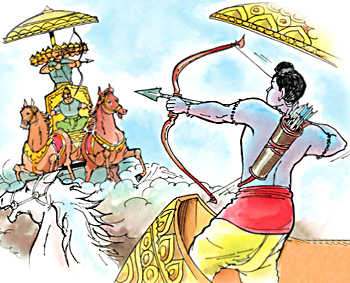 Combat between Rama and Ravana forms a prominent part of the Yuddha Kanda. After the death of Indrajit in the hands of Lakshmana, Ravana became furious and with the last demon army including Big-belly and Squint-eye and Great-flank he entered the battlefield to fight against Rama and Lakshmana. The monkeys could not stand before him, but were destroyed like flies in fire, while Sugriva engaged in single fight with Squint-eye and was successful in killing the demon, and thus both armies joined again, and there staged a deadly slaughter on either hand, and either army shrank like a pond in summer. Then Big-belly was slain by Sugriva, and Angada killed the death of Great-flank, so that the monkeys roared with triumph. But then Ravana came on, bearing a Brahma weapon, and scattered the monkeys left and right.
Combat between Rama and Ravana forms a prominent part of the Yuddha Kanda. After the death of Indrajit in the hands of Lakshmana, Ravana became furious and with the last demon army including Big-belly and Squint-eye and Great-flank he entered the battlefield to fight against Rama and Lakshmana. The monkeys could not stand before him, but were destroyed like flies in fire, while Sugriva engaged in single fight with Squint-eye and was successful in killing the demon, and thus both armies joined again, and there staged a deadly slaughter on either hand, and either army shrank like a pond in summer. Then Big-belly was slain by Sugriva, and Angada killed the death of Great-flank, so that the monkeys roared with triumph. But then Ravana came on, bearing a Brahma weapon, and scattered the monkeys left and right.
Ravana did not stay in the battlefield where he had to fight against Sugriva, Angada and Hanuman since he came to fight against Rama and Lakshmana. Thus he took his way where Rama stood aside, with great eyes like the petals of a lotus, long of arm, unconquerable, holding a bow so huge it seemed to be painted on the sky. Rama set arrows to the bow and drew the string, so that a thousand rakshasas died of terror when they heard it twang. Then a deadly battle began between the two renowned fighters. Those arrows pierced the king of Lanka like five-hooded serpents, and fell hissing to the ground; but Ravana lifted up a dreadful asura weapon, and let fly at Rama a shower of arrows having lion- and tiger-faces, and some with gaping mouths like wolves. Rama replied them with shafts faced like the sun and stars, like meteors or lightning flashes, destroying the shafts of Ravana. Then Ravana fought with other celestial weapons, and he lifted a Rudra shaft, irresistible and flaming, hung with eight noisy bells, and hurled it at Vibhishana; but Lakshmana came before it in and saved Vibhishana from death.
Lakshmana was severely wounded by the Rudra shaft from Ravana and the shaft struck the breast of Lakshmana and laid him low. Nor could any monkey draw out the shaft from his chest and then Rama stooped and drew it forth and broke it in twain, and then, grieved out of measure for Lakshmana and angered by his grief, Rama called to Hanuman and Sugriva, he told that the time has come when he should kill Ravana at once. Then Rama set his mind upon the battle, while Hanuman went again to Himalaya and brought the mount of healing herbs in order to cure Lakshmana, and Sushena took the life-giving plant and made Lakshmana to smell its savour, so that he rose up whole and well. Then Lakshmana embraced his brother, and urged him to achieve his promise that very day. Then Sakra, epithet Of Lord Indra, sent his car from heaven and his charioteer, named Matall, to help the son of Dasaratha in his fight, and Rama went about and greeted it, and, mounting upon it, seemed to light the whole world with his splendour. But Ravana loosed at him a rakshasa weapon, and its golden shafts, with fiery faces vomiting flames, poured over Rama from every side and changed to venomous serpents. But Rama took a Garuda weapon and loosed a flight of golden arrows, changing at will to birds, and devouring all the serpent arrows of the rakshasa.
The presiding deities of all the weapons came to stand by Rama, and with this auspicious omen and other happy signs Rama began to harass Ravana sorely, and wounded him, so that his charioteer, thinking him as if at the point of death, turned away from the battlefield. Then the revered rishi Agastya came with the gods to witness the defeat of Ravana. He came close to Rama and taught him the eternal secret in order to kill the demon king Ravana. He asked Rama to pray the Sun in order to kill Ravana.



















